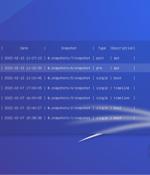Security News

The newly found malware, dubbed B1txor20 by researchers at Qihoo 360's Network Security Research Lab, focuses its attacks on Linux ARM, X64 CPU architecture devices. The botnet uses exploits targeting the Log4J vulnerability to infect new hosts, a very appealing attack vector seeing that dozens of vendors use the vulnerable Apache Log4j logging library.

Dirty Pipe, a recently reported local privilege escalation vulnerability, affects the Linux kernel on QNAP NAS running QTS 5.0.x and QuTS hero h5.0.x, QNAP advised. QTS 5.0.x on all QNAP x86-based NAS and certain QNAP ARM-based NAS. QuTS hero h5.0.x on all QNAP x86-based NAS and certain QNAP ARM-based NAS. QNAP NAS running QTS 4.x aren't affected.

A newly disclosed security flaw in the Linux kernel could be leveraged by a local adversary to gain elevated privileges on vulnerable systems to execute arbitrary code, escape containers, or induce a kernel panic. Tracked as CVE-2022-25636, the vulnerability impacts Linux kernel versions 5.4 through 5.6.10 and is a result of a heap out-of-bounds write in the netfilter subcomponent in the kernel.

Taiwanese hardware vendor QNAP warns most of its Network Attached Storage devices are impacted by a high severity Linux vulnerability dubbed 'Dirty Pipe' that allows attackers with local access to gain root privileges. The 'Dirty Pipe' security bug affects Linux Kernel 5.8 and later versions, even on Android devices.

Mozilla fixes Firefox zero-days exploited in the wildMozilla has released an out-of-band security update for Firefox, Firefox Focus, and Thunderbird, fixing two critical vulnerabilities exploited by attackers in the wild. Easily exploitable Linux bug gives root access to attackersAn easily exploitable vulnerability in the Linux kernel can be used by local unprivileged users to gain root privileges on vulnerable systems by taking advantage of already public exploits.

Offensive Security has announced its implementation of a file system snapshot in Kali Linux, a feature designed to add VM-like snapshotting to bare-metal installs. Unkaputtbar adds a new boot menu that allows Kali Linux users to boot directly into snapshots to roll back to previous system states.

The Offensive Security team has released Kali Unkaputtbar, a new feature that allows Kali Linux installed on bare-metal to make system snapshots automatically, thus enabling users to roll back to a previous system state after a botched upgrade. In German, "Unkaputtbar" means "Indestructible," and this new feature is meant to make life easier for those users who prefer bare-metal Kali installations.

SSHFS makes it possible to mount remote filesystems via an SSH connection. SSHFS uses SFTP to mount a remote directory on a local machine such that the connection between the client and server is encrypted.

Max Kellermann, a coder and security researcher for German content management software creators CM4all, has just published a fascinating report about a Linux kernel bug that was patched recently. He called the vulnerability Dirty Pipe, because it involves insecure interaction between a true Linux file and a Linux pipe, which is a memory-only data buffer that can be used like a file.

Linux distributions are in the process of issuing patches to address a newly disclosed security vulnerability in the kernel that could allow an attacker to overwrite arbitrary data into any read-only files and allow for a complete takeover of affected systems. The Linux kernel flaw is said to have existed since version 5.8, with the vulnerability sharing similarities to that of Dirty Cow, which came to light in October 2016.